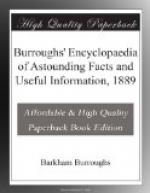to take their departure. 5. If a live rat be
caught, and a small bell be fastened around his neck,
and allowed to escape, all of his brother rats as
well as himself will very soon go to some other neighbor’s
house. 6. Take a pan, about twelve inches deep,
and half fill it with water; then sprinkle some bran
on the water and set the pan in a place where the
rats most frequent. In the morning you will find
several rats in the pan. 7. Flour, three parts;
sugar, one-half part; sulphur, two parts, and phosphorus,
two parts. Smear on meat, and place near where
the rats are most troublesome. 8. Squills are
an excellent poison for rats. The powder should
be mixed with some fatty substance, and spread upon
slices of bread. The pulp of onions is also very
good. Rats are very fond of either. 9. Take
two ounces of carbonate of barytes, and mix with one
pound of suet or tallow, place a portion of this within
their holes and about their haunts. It is greedily
eaten, produces great thirst, and death ensues after
drinking. This is a very effectual poison, because
it is both tasteless and odorless. 10. Take one
ounce of finely powdered arsenic, one ounce of lard;
mix these into a paste with meal, put it about the
haunts of rats. They will eat of it greedily.
11. Make a paste of one ounce of flour, one-half
gill of water, one drachm of phosphorus, and one ounce
of flour. Or, one ounce of flour, two ounces
of powdered cheese crumbs, and one-half drachm of
phosphorus; add to each of these mixtures a few drops
of the oil of rhodium, and spread this on thin pieces
of bread like butter; the rats will eat of this greedily,
and it is a sure poison. 12. Mix some ground
plaster of paris with some sugar and indian meal.
Set it about on plates, and leave beside each plate
a saucer of water. When the rats have eaten the
mixture they will drink the water and die. To
attract them toward it, you may sprinkle on the edges
of the plates a little of the oil of rhodium.
Another method of getting rid of rats is, to strew
pounded potash on their holes. The potash gets
into their coats and irritates the skin, and the rats
desert the place. 13. The dutch method:
this is said to be used successfully in holland; we
have, however, never tried it. A number of rats
are left together to themselves in a very large trap
or cage, with no food whatever; their craving hunger
will, at last, cause them to fight and the weakest
will be eaten by the others; after a short time the
fight is renewed, and the next weakest is the victim,
and so it goes on till one strong rat is left.
When this one has eaten the last remains of any of
the others, it is set loose; the animal has now acquired
such a taste for rat-flesh that he is the terror of
ratdom, going round seeking what rat he may devour.
In an incredibly short time the premises are abandoned
by all other rats, which will not come back before
the cannibal rat has left or has died. 14. Catch
a rat and smear him over with a mixture of phosphorus
and lard, and then let him loose. The house will
soon be emptied of these pests.




